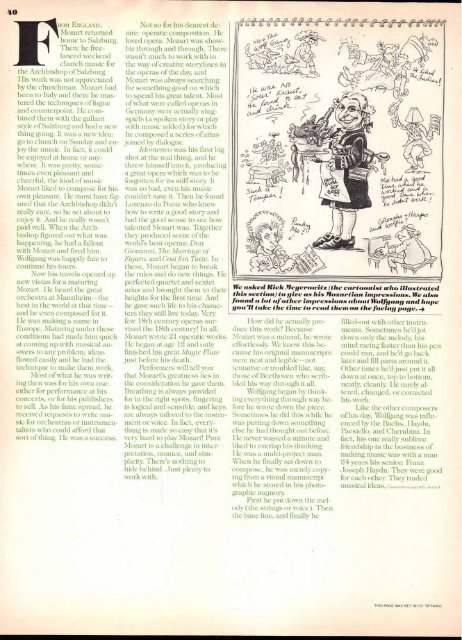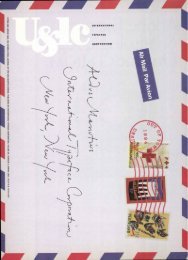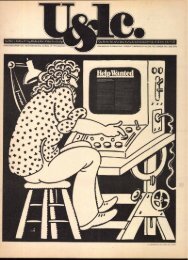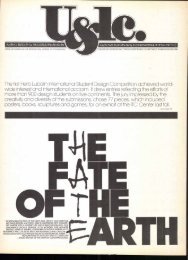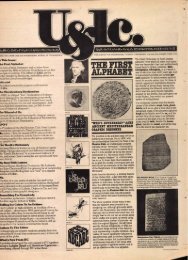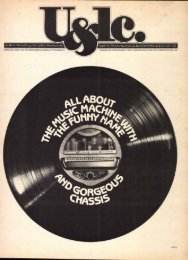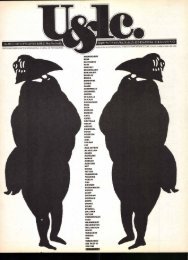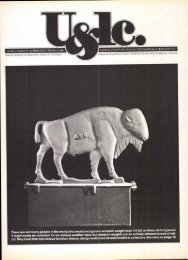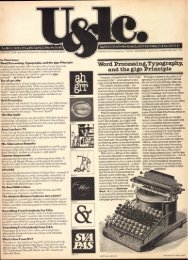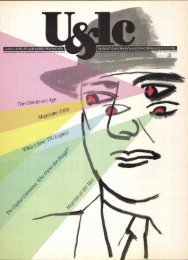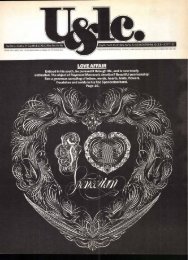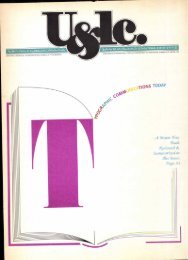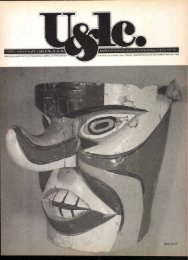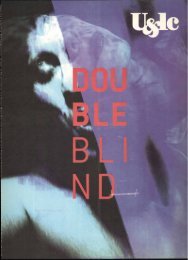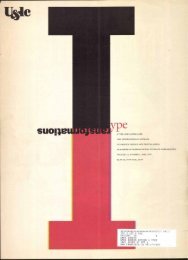Volume 9–2 (Low Res).pdf
Volume 9–2 (Low Res).pdf
Volume 9–2 (Low Res).pdf
Create successful ePaper yourself
Turn your PDF publications into a flip-book with our unique Google optimized e-Paper software.
IIII‘ 40<br />
ROM ENGLAND,<br />
Mozart returned<br />
home to Salzburg.<br />
There he freelanced<br />
weekend<br />
church music for<br />
the Archbishop of Salzburg.<br />
His work was not appreciated<br />
by the churchman. Mozart had<br />
been to Italy and there he mastered<br />
the techniques of fugue<br />
. and counterpoint. He combined<br />
them with the gallant<br />
style of Salzburg and had a new<br />
thing going. It was a new idea:<br />
go to church on Sunday and enjoy<br />
the music. In fact, it could<br />
be enjoyed at home or. anywhere.<br />
It was pretty, sometimes<br />
even pleasant and<br />
cheerful, the kind of music<br />
Mozart liked to compose for his<br />
own pleasure. He must have figured<br />
that the Archbishop didn't<br />
really care, so he set about to<br />
enjoy it. And he really wasn't<br />
paid well. When the Archbishop<br />
figured out what was<br />
happening, he had a fallout<br />
with Mozart and fired him.<br />
Wolfgang was happily free to<br />
continue his tours.<br />
Now his travels opened up<br />
new vistas for a maturing<br />
Mozart. He heard the great<br />
orchestra at Mannheim—the<br />
best in the world at that time—<br />
and he even composed for it.<br />
He was making a name in<br />
Europe. Maturing under these<br />
conditions had made him quick<br />
at coming up with musical answers<br />
to any problem; ideas<br />
flowed easily and he had the<br />
technique to make them work.<br />
Most of what he was writing<br />
then was for his own use:<br />
either for performance at his<br />
concerts, or for his publishers<br />
to sell. As his fame spread, he<br />
received requests to write music<br />
for orchestras or instrumentalists<br />
who could afford that<br />
sort of thing. He was a success.<br />
Not so for his dearest desire:<br />
operatic composition. He<br />
loved opera. Mozart was showbiz<br />
through and through. There<br />
wasn't much to work with in<br />
the way of creative storylines in<br />
the operas of the day, and<br />
Mozart was always searching<br />
for something good on which<br />
to spend his great talent. Most<br />
of what were called operas in<br />
Germany were actually sing-<br />
spiels (a spoken story or play<br />
with music added) for which<br />
he composed a series of arias<br />
joined by dialogue.<br />
Idomeneo was his first big<br />
shot at the real thing, and he<br />
threw himself into it, producing<br />
a great opera which was to be<br />
forgotten for its stiff story. It<br />
was so bad, even his music<br />
couldn't save it. Then he found<br />
Lorenzo da Ponte who knew<br />
how to write a good story and<br />
had the good sense to see how<br />
talented Mozart was. Together<br />
they produced some of the<br />
world's best operas: Don<br />
Giovanni, The Marriage of<br />
Figaro, and Cosi fan Tutte. In<br />
these, Mozart began to break<br />
the rules and do new things. He<br />
perfected quartet and sextet<br />
arias and brought them to their<br />
heights for the first time. And<br />
he gave such life to his characters<br />
they still live today. Very<br />
few 18th century operas survived<br />
the 18th century! In all,<br />
Mozart wrote 21 operatic works.<br />
He began at age 12 and only<br />
finished his great Magic Flute<br />
just before his death.<br />
Performers will tell you<br />
that Mozart's greatness lies in<br />
the consideration he gave them.<br />
Breathing is always provided<br />
for in the right spots; fingering<br />
is logical and sensible; and keys<br />
are always tailored to the instrument<br />
or voice. In fact, everything<br />
is made so easy that it's<br />
very hard to play Mozart! Pure<br />
Mozart is a challenge in interpretation,<br />
nuance, and simplicity.<br />
There's nothing to<br />
hide behind Just plenty to<br />
work with.<br />
We asked Rick Meyerowitz (the cartoonist who illustrated<br />
this section) to give us his Mozartian impressions. We also<br />
found a lot of other impressions about Wolfgang and hope<br />
you'll take the time to read them on the facing page.<br />
How did he actually produce<br />
this work? Because<br />
Mozart was a natural, he wrote<br />
effortlessly. We know this because<br />
his original manuscripts<br />
were neat and legible—not<br />
tentative or troubled like, say,<br />
those of Beethoven who scribbled<br />
his way through it all.<br />
Wolfgang began by thinking<br />
everything through way before<br />
he wrote down the piece.<br />
Sometimes he did this while he<br />
was putting down something<br />
else he had thought out before.<br />
He never wasted a minute and<br />
liked to overlap his thinking.<br />
He was a multi-project man.<br />
When he finally sat down to<br />
compose, he was merely copying<br />
from a visual manuscript<br />
which he stored in his photographic<br />
mcmory.<br />
First he put down the melody<br />
(the strings or voice). Then<br />
the base line, and finally he<br />
filled-out with other instruments.<br />
Sometimes he'd jot<br />
down only the melody, his<br />
mind racing faster than his pen<br />
could run, and he'd go back<br />
later and fill parts around it.<br />
Other times he'd just put it all<br />
down at once, top to bottom,<br />
neatly, cleanly. He rarely altered,<br />
changed, or corrected<br />
his work.<br />
Like the other composers<br />
of his day, Wolfgang was influenced<br />
by the Bachs, Haydn,<br />
Paesiello, and Cherubini. In<br />
fact, his one really sublime<br />
friendship in the business of<br />
making music was with a man<br />
24 years his senior: Franz<br />
Joseph Haydn. They were good<br />
for each other. They traded<br />
musical ideas, Continued on page 42 column 4 .<br />
THIS PAGE WAS SET IN ITC TIFFANY,


